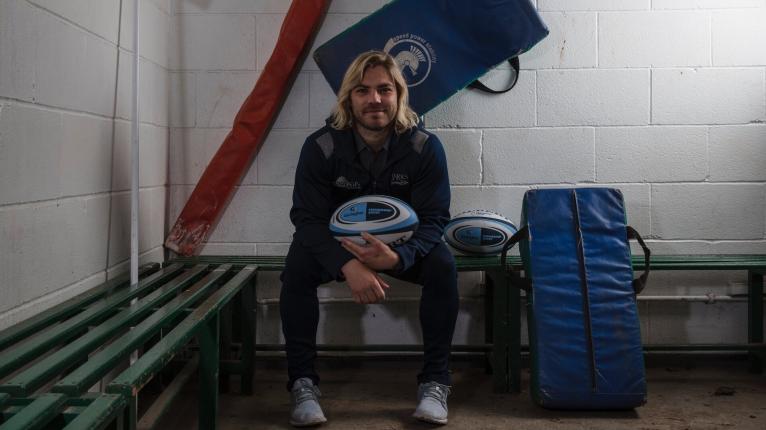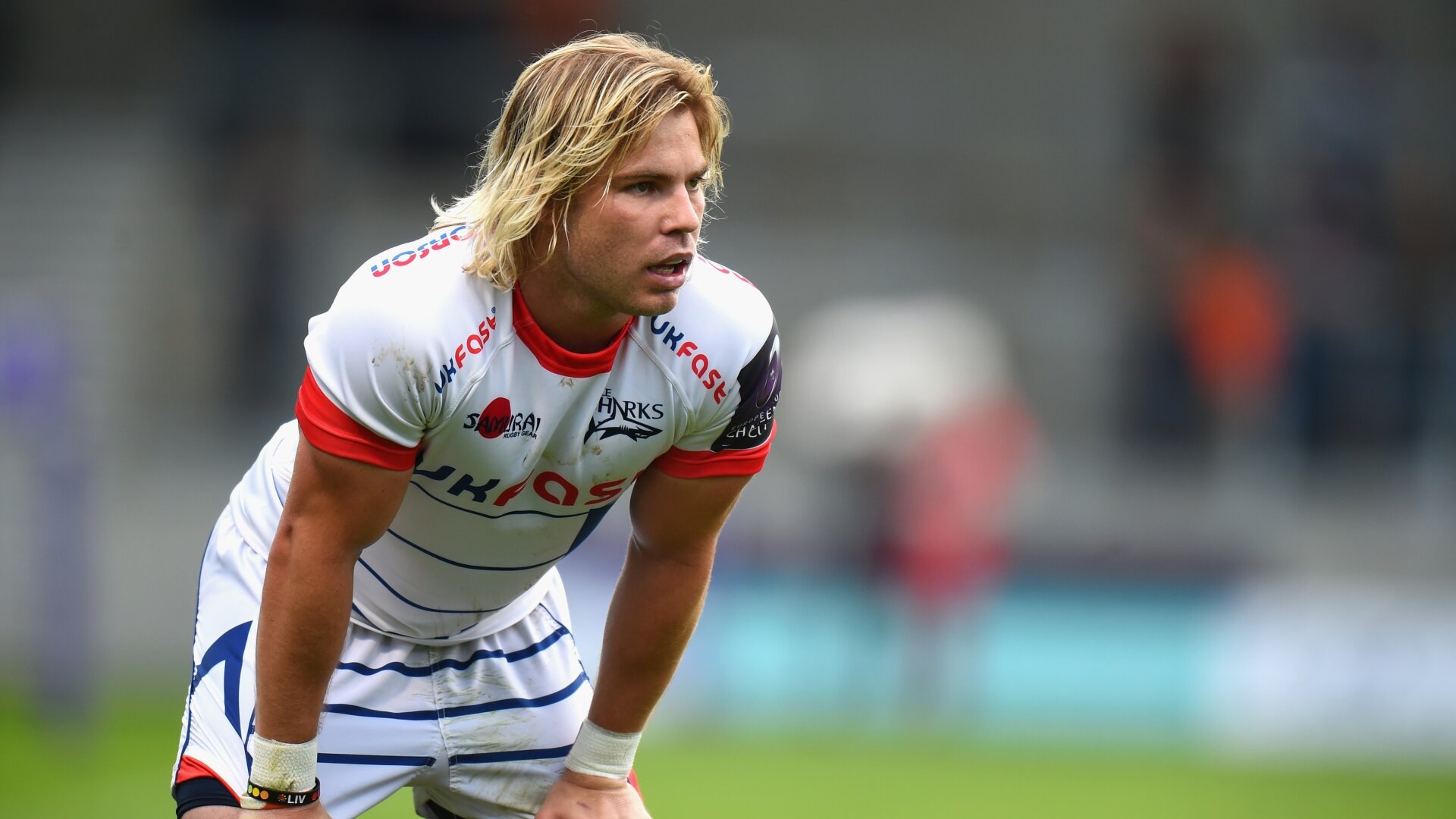'I expected a bit more angry Steve Diamond... but he was really calm'

Faf de Klerk couldn’t believe his eyes. There were Sale, revelling in a five-match unbeaten league run and then boom… they imploded embarrassingly at Northampton and conceded the most points in their Premiership history. Ouch.
If ever there was a time for Steve Diamond to read his players the riot act, this was it. Professional teams should never be lining up behind their posts watching an opposition attempt to convert their nine tries, but the Sale coach somehow managed to button it, to keep his peace and instead set about getting a reaction in a very different way to the 17-67 humiliation.
His unexpected approach worked, too. Sale lifted their carcass off the Franklin’s Gardens floor to sting Wasps eight days later some 30-odd miles elsewhere in the Midlands. Funny old game? You bet.
“I expected a bit more angry Steve Diamond,” said de Klerk when RugbyPass asked for an insight into the fall-out that followed the 50-point defeat which should have left the Sharks squad sheepish about collecting their week’s salary.
“He was really calm and that was basically what he said: ‘We’re going to have to put this one behind us but keep this disappointment, come in on Monday and we’re going to work through it.’
“We didn’t spend a lot of time on that game. We just focused on Wasps, just focused on what we wanted to do and that was great to just shift the focus. But in saying that, we all knew what that felt like, we knew if we weren’t going to pitch up for that game against Wasps it was probably going to happen again because they have got such attacking threats.
“But Steve was actually quite calm and got us focused quite quickly on Wasps just to keep that disappointment and make sure it doesn’t happen again. We definitely weren’t mentally switched on. They were a lot of new combinations.
“People saw familiar faces but we hadn’t played together for ages. I hadn’t played with AJ (MacGinty) for I don’t know how long. And we also came off a long break, a four-week break where we hadn’t played any rugby and the other teams had continued momentum.

“But that is all excuses, we were just not mentally up for it and Northampton were. There were some sore bodies Monday but to see the bounce back at training was amazing. We don’t always need a bounce back, we need to be more consistent. But we are still growing as a group.”
De Klerk sounds level-headed when putting his rugby into perspective, his religious beliefs playing a huge role in keeping him grounded.
“100 per cent. It’s the biggest thing that I would go to every day and every night, especially before a game. It helped me a lot coming over here (to England). You said about the pressure, I can always just say a quick prayer if I need to and I get a lot of motivation from that. Luckily enough, I feel privileged to do what I love.”
Thanx for all the messages? Very blessed to a part of this group. All honor to the Man upstairs? #special #thankful #blessed pic.twitter.com/qVaFH8TQfC
— Faf de klerk (@fafdeklerk) November 11, 2018
His faith hasn’t yet turned many heads at Sale, unlike at Ulster some years ago where Ruan Pienaar instigated a weekly Bible study session and regularly attended the Christian Fellowship Church in Belfast in the company of a number of team-mates.
“Mostly I’m on my own but we spoke about it the other day and said we might try and start something at the club, see if we can get a few guys to come and take it from there. It’s a really big thing for me and I will always stand by that, and if we can get a few guys going that would be great.
“There is not much (religious talk) in England. There was a bit more in South Africa, the people are more open to it and more used to it, especially at the Lions where we were very open about it, very religious, but not in England as much. Maybe we can get a few more people turning to the Lord more. It’s something I really hold dear to myself.”

De Klerk has every reason to feel that way. Few would have thought he would have got a Springbok recall when he decided to quit South African club rugby for life in Manchester. Seventeen months the 27-year-old went in between caps.
The game-changing call came from Rassie Erasmus, who twisted the rules enforced on him from on high to get the struggling Boks firing again from last June onwards. That resurgence swept de Klerk all the way to a World Player of the Year award nomination.
“Amazing. I must say I did not expect to get that call, especially with the 30-cap rule that was going on (for overseas-based players). That was real special. Going back it showed that I was worthy of being there. He [Erasmus] had put his trust in me, so I needed to perform. Luckily it came off in the end and hopefully I can continue to be in the squad, but I need to play well for my club and be worthy of being there again.
“Rassie’s a great character. He loves the jersey, loves South Africa. He wants to make people proud of us again and he has the knack to just create something special again in the group.”

Manchester is becoming a home from home for fellow itchy-footed South Africans looking to pocket some Sterling rather than the Rand. Only this past week in the lead-up to Saturday’s latest Premiership fixture, a home match versus Exeter, the club revealed it had snapped up out-half Robert du Perez and hooker Akker van der Merwe from the Durban-based Sharks on three-year deals.
De Klerk’s flowing blond locks make him one of world rugby’s more readily identifiable players, but his distinctive mane never comes up in conversation when he attends events such as last Wednesday night’s Gallagher-sponsored Train With Your Heroes session at Lymm RFC under-15s.
“They have confidence coming here that it is a good environment to come into. I know where we want to go as a club and I know Dimes [Diamond], everything he says he comes through on, just the focus on where we are going to take the club and the ambition we have. It’s good for a player to come here and see how he can push himself. For me being here, it shows you can grow your rugby, enjoy being here and enjoy being yourself. It’s a good attraction.”
A very open discussion with @DennySolomona in @RugbyPass about coping with mistakes and depression. It’s important to hear from someone successful that #ItsOkNotToBeOk and everyone makes mistakes. Thank you for sharing Denny #MentalHealthAwareness https://t.co/5ZAB8FzBlJ
— Sale FC Rugby (@SaleFC) March 1, 2019
“It’s always good to see the kids smiling, playing around and asking you all these questions. It’s always really good fun and I enjoy it. Quite a lot of what I’m asked is how do I tackle big guys because I am so small (5ft 8ins). I get asked that quite a lot.
“I normally just say I go in as hard as I can and catch them unexpected. With most big guys nothing is going to be easy, so just run in as hard as possible.”
That’s an aggressive approach that has served de Klerk very well.
In other news: Leinster’s Leo Cullen speaks about the possibility of securing a PRO14 home semi




























































































